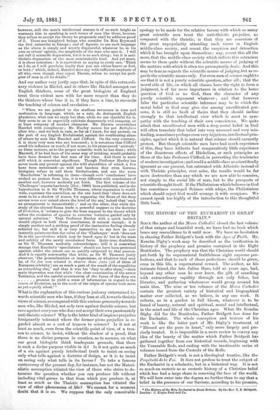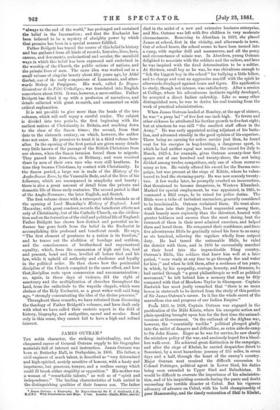THE HISTORY OF THE EUCHARIST IN GREAT BRITAIN.*
SINCE the author of the Mores Catholici closed the last volume' of that unique and beautiful work, we have had no book which bears any resemblance to it until now. We have no hesitation in classing Father Bridgett's book with the Ages of Faith. Mr, Kenelm Digby's work may be described as the verification in, history of the prophecy and promise contained in the Eight Beatitudes. The prophecy was that the Christian world should put forth by its supernatural fruitfulness eight supreme per- fections, and that to each of those perfections should be given, even in this life, a supernatural reward. The author, as his intimate friend, the late Julius Hare, told us years ago, had beyond any other man he ever knew, the gift of searching with extraordinary rapidity through not only folios, but libraries, and gathering whatsoever would group around his. main idea. The nine or ten volumes of the Mores Catholici contain the greatest variety of historical and biographical matter ever collected, as we believe, in any one work. It reflects, as in a garden in full bloom, whatever is to be found of beauty, natural and spiritual, moral and intellectual, in the mind and life of the Christian ages. What Mr. Kenelm Digby did for the Beatitudes, Father Bridgett has done for the Eucharist. The whole conception and texture of his work is like the latter part of Mr. Digby's treatment of "Blessed are the pure in heart," only more largely and pre- cisely treated. It is impossible in a mere review to convey any idea of the beauty of the matter which Father Bridgett has gathered together from our historical records, beginning with the Venerable Bede, and ending with the inestimable series of volumes issued from the Custody of the Rolls.
Father Bridgett's work is not a theological treatise, like the Perpgtuitg de la Foi. It does not profess to treat the subject ot the Eucharist in a scholastic, but in a historical way. It is not so much an esoteric as as exoteric history of a Christian belief which has had a large share in renewing the face of the world. We will here enter into the dogma no further than to say that a belief in the presence of our Saviour, according to his promise,.
• The History of the Holy Eucharist in Great Britain. By the Rey. T. E. Bridgett. London : C. Regan Pant and Co. "always to the end of the world," has prolonged and sustained the belief in the Incarnation ; and that the Eucharist has been believed to be a mystery of almighty power by which that promise has been in a special manner fulfilled.
Father Bridgett has traced the course of this belief in history and has gathered from all kinds of records, histories, lives, laws, canons, and documents, ecclesiastical and secular, the manifold ways in which this belief has been expressed and enshrined in the worship of the Church, the public actions of nations, and the private lives of men. The same idea was worked out in a small volume of singular beauty about fifty years ago, by Abbe Gerbet, one of the early companions of Lamennais, and after- wards Bishop of Perpignan. His work, called Le Dogme Generateur de la Flag Catholique, was translated into English somewhere about 1836. It was, however, a mere outline. Father Bridgett has fitted it up with a profusion of narratives, and details collected with great research, and commented on with critical explanation.
It is not possible to give more than the heads of the two volumes, which will well repay a careful reader. The subject is divided into two periods, the first beginning with the earliest notices of Christianity in Britain, and reaching down to the close of the Saxon times ; the second, from that date to the sixteenth century, on which, however, the author does not enter. He promises to treat it in a third volume here- after. In the opening of the first period are given many details very little known of the passage of the British Christians from our shores, when the Saxon invasion forced them to migrate. They passed into Armorica, or Brittany, and were received there by men of their own race who were still heathens. In time they became Christians, by contact with Christianity. In the Saxon period, a large use is made of the History of the Anglo-Saxon Race, by the Venerable Bede, and of the lives of his followers, which are unsurpassed in simplicity and beauty ; there is also a great amount of detail from the private and domestic life of those early centuries. The second period is that of the Anglo-Normans ; the later English, and Scotch.
The first volume closes with a retrospect which reminds us of the opening of Lord llacaulay's History of England. Lord Macaulay, with great candour, records the beneficent effects not only of Christianity, but of the Catholic Church, on the civilisa- tion and on the formation of the civil and political life of England. Father Bridgett has shown how distinct and powerful an in- fluence has gone forth from the belief in the Eucharist in accomplishing this profound and beneficent result. He says, "The first element of greatness to a nation is its freedom," and he traces out the abolition of bondage and serfdom, and the consciousness of brotherhood and supernatural equality, which, from the communion of high and low, lord and peasant, bond and free, levelled all before God and his law, while it upheld all authority and obedience and loyalty in the political order. He then shows how the penitential discipline of the Church conspired to the same effect, and how thakdiscipline rests upon communion and excommunication ; so, again, in those days of violence, did the right of sanctuary and the multiplication of churches throughout the land, from the cathedrals to the wayside chapels, which were shrines of the Holy Eucharist, as a great writer well said long ago, "strongly concentrating the idea of the divine presence."
Throughout these remarks, we have refrained from discussing the theology of Father Bridgett's volumes, and have dealt only with what we have called their exoteric aspect in the field of history, biography, and antiquities, sacred and secular. Read -only in this sense, they cannot fail to have a high and refined interest.



































 Previous page
Previous page